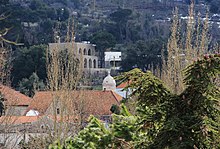Lebanese nationalism



Lebanese nationalism is a nationalist ideology which considers the Lebanese people as a separate nation independent from the Arab world and strives to maintain Lebanon as an independent nation-state. The ideology may consider the Lebanese people to be direct descendants of the Phoenicians, a concept associated with Phoenicianism.
The ideology is highly controversial and has been criticized for disuniting the Lebanese people rather than uniting them. While Lebanese nationalism appeals to the Lebanese Maronite community, it is generally unpopular among Lebanese Muslims, who often support Pan-Arabism and Pan-Islamism, as well as among Greek Orthodox Christians.[2]
History
[edit]The Druze and Maronite community in Lebanon played an important role in the formation of the modern state of Lebanon in the early 18th century, through a governing and social system known as the "Maronite-Druze dualism" in Mount Lebanon Mutasarrifate[1] This ideology is rooted in the 19th-century sectarian war between the Maronites and Druze that occurred in Mount Lebanon.[citation needed] It took its formalized form during the inter-war period and the French Mandate of Syria, when it served primarily as a tool in opposing Arab nationalism and in justifying the existence of the nascent country of Lebanon.
During the 20th century, especially during the Lebanese Civil War, Lebanese nationalism was associated with the Kataeb Party, Lebanese Forces, National Liberal Party and secularist movements like Guardians of the Cedars, National Bloc and the Lebanese Renewal Party, spearheaded by the renowned late Lebanese poet and philosopher Said Akl. It was also present among the Shiite Muslims of the Amal movement and a central ideology of its armed wing, the Lebanese Resistance Regiments.[3] Currently, it is present among the multi-confessional Lebanese Resistance Brigades subordinate to Hezbollah.[4] As a result, Lebanese nationalists have never formed a bloc, being very different ideologically and having divergent opinions on which allies to choose, all adding up to confessionalism.
Lebanese nationalism goes even further and incorporates irredentist views going beyond the Lebanese borders and seeks to unify all the lands of ancient Phoenicia around present-day Lebanon.[5] That comes from the fact that present-day Lebanon, the Mediterranean coast of Syria, and northern Israel is the area that roughly correspond to ancient Phoenicia and so most Lebanese people identify with the ancient Phoenician population of that region.[6] Therefore, the proposed Greater Lebanese country includes Lebanon, Mediterranean coast of Syria, and northern Israel.
See also
[edit]Notable Lebanese nationalists
[edit]- Youssef Bey Karam (1823–1889), Christian governor
- Elias Peter Hoayek (1843–1931), Maronite patriarch of Antioch
- Camille Chamoun (1900–1987), president of Lebanon
- Pierre Gemayel (1905–1984), politician
- Said Akl, (1911–2014), poet, philosopher, writer, playwright, and language reformer
- Michel Aoun (1933–), President of Lebanon Free Patriotic Movement
- Dany Chamoun (1934–1990), politician
- Etienne Sakr (born 1937), nationalist leader
- Bachir Gemayel (1947–1982), president of Lebanon
References
[edit]- ^ a b Deeb, Marius (2013). Syria, Iran, and Hezbollah: The Unholy Alliance and Its War on Lebanon. Hoover Press. ISBN 9780817916664.
the Maronites and the Druze, who founded Lebanon in the early eighteenth century.
- ^ Encyclopedia of Nationalism, Two-Volume Set. Elsevier. 2000-10-27. p. 294. ISBN 978-0-08-054524-0.
- ^ Norton, Augustus Richard (1987). Amal and the Shi'a: Struggle for the Soul of Lebanon. Austin: University of Texas Press. p. 39. ISBN 978-0292730403.
- ^ "Christian, Sunni And Shia: Meet Hezbollah's Non-Denominational Military Branch Defending Lebanon, Fighting In Syria". International Business Times. 4 November 2015.
- ^ Reviving Phoenicia: The Search for Identity in Lebanon By Asher Kaufman
- ^ Kamal S. Salibi, "The Lebanese Identity" Journal of Contemporary History 6.1, Nationalism and Separatism (1971:76-86).
External links
[edit] Media related to Lebanese nationalism at Wikimedia Commons
Media related to Lebanese nationalism at Wikimedia Commons

